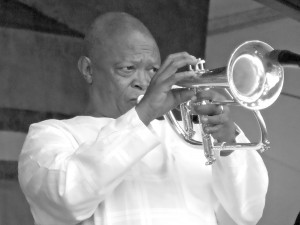Musician and Anti-Apartheid activist Hugh Masekela dies
29th January 2018 · 0 Comments
By Geraldine Wyckoff
Contributing Writer
Hugh Masekela was an important and influential man. Born in South Africa on April 4, 1939, the trumpeter, flugelhornist, singer and composer pioneered jazz in his homeland and spread his anti-apartheid message via his music, words and actions throughout the world. Masekela, who for three decades found exile and freedom in the United States, died in Johannesburg, South Africa on Tuesday, January 23, 2018. He was 78.
“I was marinated in jazz and I was seasoned in music from home,” Masekela was quoted as saying in an interview with The New York Times. Those combined flavors rang through his music making it accessible to a broad range of listeners. His 1968 hit, “Grazing in the Grass,” became his trademark and lives on in jazz clubs and even as played by New Orleans brass bands at the second line parades. With its memorable melody and swaying rhythm, many bands on the street turn to the song when it seems time for them to chill and perhaps smooth out a particularly exuberant crowd.
As a youngster, Masekela began playing piano though he became enthralled with the trumpet after seeing the movie Young Man with a Horn, a film based loosely on the life of American jazz artist Bix Beiderbecke. At age 14, the future star got his first trumpet which was sent from Louis Armstrong to equal rights advocate Father Trevor Huddleson who in turn presented it to Masekela. He and his music-loving schoolmates were members of the Huddleson Jazz Band, the first youth orchestra in South Africa. Another important first in Masekela’s storied career was when he and several other jazz artists including renowned pianist Abdullah Ibrahim (then know as Dollar Brand) formed the Jazz Epistles that is famed for being the first jazz band in the country to record an album. (Masekela and Ibrahim were to be united and the Jazz Epistles resurrected at the 2017 Jazz Fest though sadly, the trumpeter had to cancel due to ill health.)Following a ban on gatherings of 10 people or more, Masekela soon left the country, initially heading to Great Britain. With the help of actor/singer Harry Belefonte, he received a scholarship to New York’s Manhattan School of Music. It’s said that trumpeters Dizzy Gillespie and Louis Armstrong encouraged Masekela to remember his African roots while delving into the art form of American jazz. The result was the early beginnings of Afro-jazz. Masekela first heard jazz artists including Louis Armstrong via 78 rpm records. Like many musicians around the globe that were touched by our musical pioneers, he felt an affinity for the city as the birthplace of jazz.
Fortunately, Masekela was a fairly frequent visitor to New Orleans, usually as a performer at the Jazz Fest. He was co-billed with Santana at the Municipal Auditorium and with the Neville Brothers and his one-time wife, vocalist Miriam Makeba, at the University of New Orleans Lakefront Arena.
“New Orleans has a great significance for me because of Louis Armstrong and Buddy Bolden, Kid Ory and King Oliver,” he declared in a 2004 interview. “If it wasn’t for those people the world would still be square. I don’t come to New Orleans like a tourist. I always said when I lived in America that if New Orleans was not so far from America I would have lived there instead of New York and Los Angeles. New Orleans is far from America – not geographically – but it’s a far place in America to get to. It’s a wonderful place that has great character. It’s not just another town.”
Masekela showed his love for this city and its people by performing at a much lower-key event than Jazz Fest. He blew his horn on a stage set up on the small grassy field next to St. Augustine Catholic Church in the heart of the Tremé. The neighborhood gathering was a modest affair with Masekela’s name on the schedule included among the local artists. The audience and the musicians were thrilled and amazed at their good fortune to hear the superstar in their “backyard.” This show might have had something to do with “Grazing in the Grass” still being vital on this city’s streets.
“Oh, yes,” he said on suddenly recalling and visualizing the scene. “The thing that I remember about it is that it felt like a South African township to a certain extent. It was nice because we don’t get to play that often in neighborhoods like that when we come to the States. It was memorable because of that.”
In 1987 Masekela released the song he wrote and recorded, “Bring Him Back Home (Nelson Mandela)” that became an anthem for the anti-apartheid movement. After Mandela’s release from prison, the trumpeter was, in a sense, freed from his exile. He returned to his homeland and died in Johannesburg, South Africa.
Among his many achievements, Masekela recorded some 40 albums, performed as a part of Paul Simon’s Graceland 25th Anniversary Tour, collaborated with fellow African musician and singer Fela Kuti and established the Botswana International School of Music.
This article originally published in the January 29, 2018 print edition of The Louisiana Weekly newspaper.




